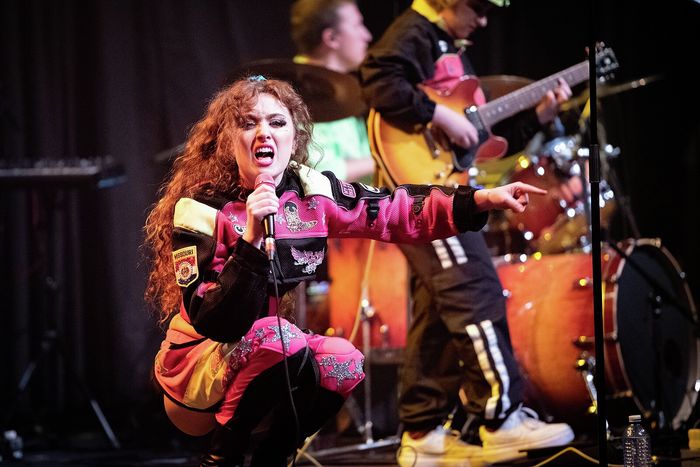No, Billie Eilish’s queerness is not inappropriate
In recent weeks, Billie Eilish has been called a predator, a queerbaiter, and a sex addict – she’s none of these things, she’s just a queer woman who likes to have sex

Billie Eilish likes girls. That’s right! The rumours were, in fact, not true, and what people saw as queerbaiting was, in fact, just a person being queer. Constant probing into her sexuality forced Billie Eilish to come out publicly before she was ready, a story we know all too well, with the likes of Heartstopper actor Kit Connor, and Disney star Joshua Bassett being outed against their will under similar scrutiny.
But now, for better or for worse, Billie is out as queer, and she’s ready to sing about it! On her most recent album Hit Me Hard and Soft she talks of desiring a woman so much that she wants to eat her for lunch, and you really can’t get much more sapphic than that. What people have found problematic, though, is her collaboration with Brat superstar Charli XCX on their remix of ‘Guess.’
“Queer culture is Billie’s to reclaim however she chooses”
In the song, Billie joins Charli in what is perhaps the most charged collection of euphemisms for cunnilingus I have ever heard, and finishes her verse with the line ‘Charli likes boys but she knows I’d hit it.’
Cue a cacophony of angry TikToks calling the line, and Billie by extension, predatory, slamming her for allegedly disrespecting and invalidating Charli’s own sexuality in order to profit off of hers. Firstly, is Billie profiting off of queer culture? Well, if you strip it down to its simplest parts, yes, she is; she is singing about having sex with a woman, and then releasing the song to the public for money. However, queer culture is Billie’s to reclaim however she chooses, and that includes making money from it. And on the allegation that Billie’s lyrics are predatory, I find it highly unlikely that Charli would have approved Billie’s lyrics on her song if she felt that they minimised her lived truth as a straight woman.
The problem is that we simply do not see enough queer people in pop music singing about being queer without shame and without censorship. It is frightening and disappointing to see the response from young people whom I’m sure would refer to themselves as allies in any other case.
We don’t allow queer people, and especially queer women, the right to be just as sexual in their art as straight people. If you turned on BBC Radio 1 right now, you would not have to wait long before hearing the reliably sexual, and reliably unsubtle, metaphors of basic pop music. So reliable are these euphemisms that I have created a drinking game for you and your friends to play:
“We simply do not see enough queer people in pop music singing about being queer without shame and without censorship”
One sip when a line in a song makes reference to clothing coming off, or being on the bedroom floor.
Take one shot when you hear a female singer ask you to ‘give it to me’. We all know what ‘it’ is, Dua Lipa, you are not slick.
Down your whole drink when you hear a song refer to someone’s touch as being a) electric, b) akin to fire, or c) something Biblical.
Try it, and when you’re halfway through a bottle of wine before you even realise what’s happening, then tell me that Billie Eilish is a sex pest because she sings about going down on women.
What we are seeing in pop music at the moment is a reassuring and refreshing opening being made for queer women to openly embrace their sexuality through their lyrics. The unabashed eroticism of Chappell Roan’s lyrics that put many a straight listener off her music are the same lyrics that create a safer space for musicians like Billie Eilish to come through with their own experiences of queerness.
However, there is still a long way to go. I am reminded of the outrage that followed when Sam Smith dared to ditch the sad piano ballads for drag-inspired tour outfits and electric club tunes, and I wonder what it is that makes Sam Smith and Billie Eilish so offensive, while Troye Sivan is so beloved.
There must be a space in mainstream music for artists who do not fit the straight masses’ perfect vision of queerness, for artists who are plus-sized, who are trans, who are not white, and who are women. And, conversely, we must not make space for speculating on the sexualities of others; they’re simply not for you to Guess.
 Interviews / You don’t need to peak at Cambridge, says Robin Harding31 December 2025
Interviews / You don’t need to peak at Cambridge, says Robin Harding31 December 2025 News / Downing investigates ‘mysterious’ underground burial vault 29 December 2025
News / Downing investigates ‘mysterious’ underground burial vault 29 December 2025 News / Unions protest handling of redundancies at Epidemiology Unit30 December 2025
News / Unions protest handling of redundancies at Epidemiology Unit30 December 2025 Lifestyle / Ask Auntie Alice29 December 2025
Lifestyle / Ask Auntie Alice29 December 2025 Features / ‘Treated like we’re incompetent’: ents officers on college micromanagement30 December 2025
Features / ‘Treated like we’re incompetent’: ents officers on college micromanagement30 December 2025









